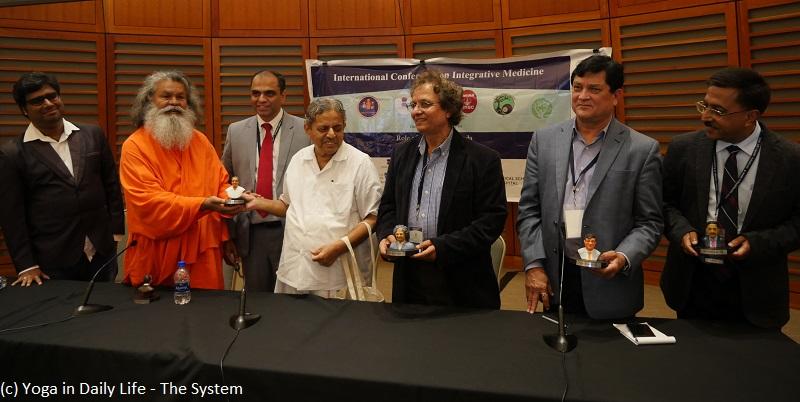3rd International Conference on Integrative Medicine, Harvard Medical School, Boston
On 22 June 2018, a delegation of Yoga in Daily Life representatives from several countries, many of them yoga instructors and health professionals, attended the opening of the 3rd International Conference on Integrative Medicine: Role of Yoga and Ayurveda, at Harvard Medical School in Boston, Massachusetts, USA.
The event was organized by the Boston Center of Excellence for Health and Human Development, in conjunction with the Consulate General of India, New York; Massachusetts General Hospital; S-VYASA Deemed University; Osher Center for Integrative Medicine at UCSF; and other respected research institutes.
Day 1
The first day of the conference was opened with the chanting of Vedic mantras and an ancient puja, performed by Vishwaguruji and other distinguished guests.
Scientists introduced the day’s program with discussions of the importance of yoga and ayurveda for the well-being of all humanity. Vishwaguruji gave a special address in which he spoke about yoga as a path to health and inner peace. He pointed out the vital importance of healthy food, clean water and a healthy environment, for a high quality of life. The crucial human energy center for obtaining good health is the manipura chakra, which can be purified through the regular practice of yogic exercises. Vishwaguruji explained a special kriya for activating the manipura chakra and purifying the physical body, energy and mind.
After Vishwaguruji’s inspiring words, the conference chairman and dear friend of Vishwaguruji, Dr. H. R. Nagendra, president of S-VYASA Deemed University, addressed the audience. He spoke about the importance of yoga and ayurveda, which is not limited only to the physical world as is allopathic medicine of the West, but also focus on prana (life force), the mind and the soul.
The conference on its first day continued with symposiums: 'Application of Ayurveda in Oncology and Palliative Care'; 'Genomics of Integrative Oncology'; 'Ayurveda and Yoga'; and 'Yoga Therapy in Cancer and Palliative Care'. Scientists of various backgrounds, from many research centers, spoke about the huge importance of integrating yoga and ayurveda in the treatment of patients with cancer and those in palliative care.
Day 2
The morning of the second day commenced with an inspiring 'Mind-Sound-Resonance Technique' meditation led by long-time friend of Yoga in Daily Life, Dr. H.R. Nagendra, who led the audience through inner and outer aspects of OM chanting. It was exactly the topic Vishwaguruji outlined during his inaugural address at the conference, stating that in too many cases OM chanting is done incorrectly, and not performed in the proper sequence of "A-U-M".
In the afternoon session, Yoga in Daily Life was actively involved by presenting the subject, 'Scientific Effects of Yoga in Daily Life – Evidence-based Approach and Policy Impact'. This extensive topic was presented by International YIDL Secretary, Gregor Kos, M.Sc., who first outlined the beginnings of the YIDL system, founded in 1971 by Vishwaguruji in Vienna, Austria. Over the past 48 years, more than 100 YIDL publications have been published, and the Yoga in Daily Life, The System manual has been translated into 12 languages. The system of Yoga in Daily Life is practiced around the world by more than 4 million people.
Mr. Kos presented the work of a Slovenian research team, Dr. Dejan Dinevski and Dr. Tine Kovačič, and mentioned two scientific research projects currently underway by Dr. Dinevski: 'Yoga and pregnancy outcomes' and 'Effects of yoga and meditation in primary school'. He continued by presenting Dr. Kovačič's projects: 'Impact of Yoga in Daily Life yoga nidra relaxation on the mental health of breast cancer patients', 'Impact of the Yoga in Daily Life system on quality of life in postmenopausal women', and 'Impact of sport activity training with the use of Yoga in Daily Life techniques on physical fitness in adolescents with intellectual disabilities'.
Numerous scientific research projects (more than 42, all proving positive effects of Yoga practice) made by a Czech Republic and Slovak Republic scientific team (Martin Repko, Vít Čaika, Alena Filková, Alena Filková, Zuzana Kornatovská, Peter Růžička, Anna Galovičová, Roman Bednár) were also presented at the conference, as well as the research of Viera Diešková, Jana Dudinska, Martin Frolo and Milan Šišmiš. These were presented in content-related blocks:
- Yoga in Daily Life and mental health
- Yoga in Daily Life and physical fitness
- Yoga and cardiopulmonary condition
- Yoga and metabolic/endocrine condition
- Yoga and musculoskeletal condition
- Yoga and specific diseases
Regarding policy impact, Mr. Kos mentioned the importance of the Swiss model, in which European complementary and integrative medicine is part of the Public Health System. He outlined '2013 WHO traditional medicine strategy: 2014-2023', a strategy that aims to support member states in developing proactive policies and implementing action plans that will strengthen the role traditional medicine plays in keeping populations healthy. He raised the questions: How many countries are WHO member states?; How many have impemented such action plans?; Why aren't there more?
Mr. Kos also presented AYUSH EUROPE, an organization established and registered for the quality control and stadardization (of education and techniques) in the fields of yoga and ayurveda in Europe.
Mr. Kos concluded with citing Ms Gemma Burford (2009): "The right of citizens to access the medical system of their choice should be formally acknowledged. That choice should be regarded as a fundamental human right, which should by no circumstances be denied them – not for reasons of scientific prejudice, nor commercial ambition."




